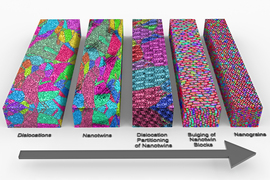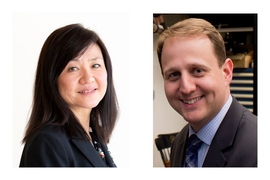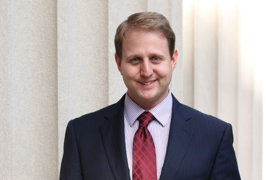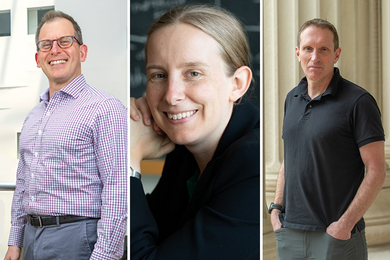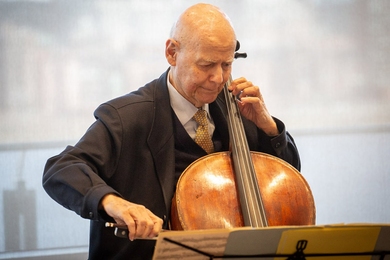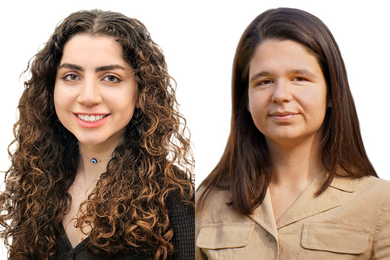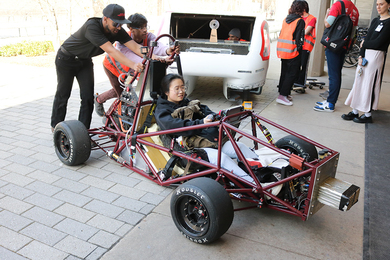A first-year graduate student in MIT’s Department of Materials Science and Engineering (DMSE) in 2007, Tim Rupert was prepared to present research at a Materials Research Society conference in Boston, his first presentation since joining the lab of Professor Chris Schuh.
“The slides were all ready, the story was all ready — I practiced it, and I was ready to go,” says Rupert, now a professor of materials science and engineering at the University of California at Irvine. “And then the Saturday before my Monday talk, I was doing some microscopy and found something really cool — but it totally changed my story. And when I say ‘totally,’ I mean, it went from a yes to a no.”
Surprised and worried that weeks of work had just been upended, Rupert shared the findings with his advisor. Instead of responding with dismay about the upcoming presentation, Schuh was excited to dig into the data, find out what it meant, and rework the story last-minute.
“He was very calming,” Rupert said. “It really helped me go from stressed to excited about the results.”
The anecdote of even-tempered mentorship is typical among recollections about Schuh, who was recently named dean of the McCormick School of Engineering and Applied Science at Northwestern University. Current and past students describe a tough but dedicated advisor with an abiding interest in their work and future success.
But a committed and inspiring educator is just one of the descriptors students and faculty members alike use to describe Schuh. Having served in DMSE for 21 years — nine of them as department head — Schuh is also remembered as a world-class scientist, an effective administrator, a repeat entrepreneur, and a generous and collaborative colleague.
A multidimensional brilliance
“Like many here at MIT, Chris is brilliant. But what’s unique about Chris is the multidimensionality of his brilliance,” says Jeffrey Grossman, the Morton and Claire Goulder and Family Professor in Environmental Systems and former department head of DMSE. “He can make contributions and operate at this extraordinary level in many different ways.”
Schuh’s expertise is metallurgy, a classical field to which Schuh brought loads of innovation. Members of his research lab made nanostructured nickel-tungsten coatings, which improved the durability and performance of many metal component surfaces. Lab members also developed nanocrystalline alloys that can be processed rapidly in large forms, with improved strength for structural applications such as military vehicles, and a ceramic-based material that can toggle between different shapes.
Schuh’s research has led to several companies, including Xtalic Corp., which commercialized his lab’s process for producing the metallic wear-and-corrosion-resistant coatings now used in the connectors of electronic devices worldwide. Other spinouts are additive manufacturing company Desktop Metal and Foundation Alloy, a metal parts production company co-founded with former student Rupert.
As department head from 2011 to 2020, Schuh is credited with big initiatives that expanded the size, clout, and prestige of DMSE. For one, he transitioned the department from a centralized office arrangement; previously, the department shared human resources and finance functions with the Department of Chemical Engineering. Under his leadership, Schuh built DMSE headquarters from the ground up, including hiring key staff.
Schuh increased the size of the faculty and acquired more physical space for offices and labs. He also launched successful fundraising campaigns, secured fellowship funding for first-year graduate students, and rolled out successful online materials science courses. “He put our department at the cutting edge of MIT,” Grossman says.
Caroline Ross, the Ford Professor of Engineering and interim head of DMSE, says Schuh’s success as an administrator owed in large part to his skill for building agreement among co-workers.
“He managed to accomplish a lot because he was good at listening,” says Ross. “He took people's thoughts and feelings into consideration and found a way to make his ideas work for the majority of people so that he could get a consensus for what he wanted to do.”
Tough love
When asked how he does it all, Schuh is modest.
“The secret is I do things that I enjoy. I’ve always gravitated toward activities that seem like fun,” Schuh says. That goes for research, teaching, academic leadership, or entrepreneurship. “I did those things because they seemed like they were the right things to do at the time for pushing the science and the technology forward and, and by extension, pushing the community forward, pushing the department forward.”
That Schuh enjoys the roles he fills, especially those of researcher and educator, is evident to the students he’s advised over the years. Veera Panova, a current graduate student in Schuh’s research group, says every meeting with him is a “productive and positive experience.”
“He’s excited about the work we’re doing,” Panova says. “I think his excitement fuels us to do better and continue pushing through the challenges and really dig deep and figure out what is at the heart of the problem or the question that we're trying to answer.”
(The Schuh Group, which is relocating with Schuh, has already started taking on new individuals from Northwestern. Schuh will advise most MIT students in the group remotely until they matriculate.)
Shiyun Ruan, a graduate student in Schuh’s group from 2005 to 2010, says it was that same sense of optimism that drove her even in times of uncertainty.
“I would go into his office and say, ‘I got crappy data,’ and he would always encourage me to ‘look for the pony in the mud,’” says Ruan, principal technical program manager at Commonwealth Fusion Systems, a fusion power company spun out of MIT in Devens, Massachusetts. “But he’s also tough — he sets his standards high. He’s not going to say, ‘Oh, because you have completed X years you can graduate.’ He really makes sure that every student that graduates from his group meets his ‘good enough’ standard.”
“Tough” is another oft-repeated word people who’ve worked with Schuh use to describe him — but it’s not a criticism; it’s an acknowledgement of the high expectations he has of them.
“When he’s tough, it’s about the science,” says Eliana Feygin, another graduate student in Schuh’s research lab. “It’s never in a mean spirit at all. It’s very much like, ‘I think you need to think more about this. I think you need to dig deeper into this.’”
Returning to roots
With his move to Northwestern, Schuh is returning to his alma mater — he earned his PhD there in 2001. “They’re in a very exciting moment where they have a new president, they have new leadership, and they have a genuine excitement about growing engineering,” Schuh says.
With a materials engineer at the helm of McCormick, Schuh sees the chance to put materials at the rightful center of engineering disciplines. “Materials science naturally integrates with every other discipline, with mechanical engineering for mechanical devices, with electrical engineering for electronic devices, with biomedical engineering, with civil engineering, with all of the other engineering disciplines,” Schuh says. “So leadership having a perspective from materials, it makes sense to me because it's a discipline that can connect and does connect very effectively with all those other disciplines. I’m excited about that opportunity.”
That said, leaving MIT and DMSE isn’t easy.
“Many of the faculty have been my friends for now over 20 years. I'm leaving my best friends behind, and that is very challenging for me,” Schuh says. “But that's tempered by the fact that they will still be my friends. I’ll just be not as physically close to them.”
Ross, the interim head of DMSE, reflects on the type of person Northwestern is getting.
“He’s a real colleague, someone who collaborates and listens. He’s a first-class scientist. He's done fantastic work in metals,” she says. Then she laughs and continues, “And we have to watch out. They have a really good department already. It's only going to get better with him joining it.”

